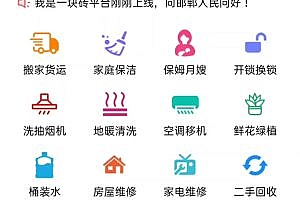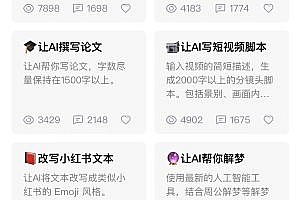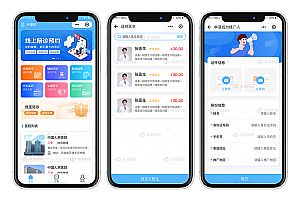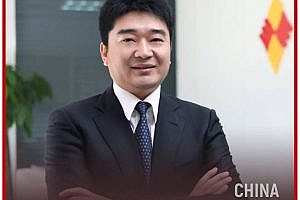Open the multifunctional tripod, secure two phones, and 33 year old Gao Yang skillfully introduces the newly launched trench coat in front of the camera. On the other end of her phone, there are nearly 30000 followers in her WeChat group, who are also her customers. Gao Yang registered as an individual business owner engaged in e-commerce sales in June this year. After the failure of her physical store entrepreneurship, she transformed from a live streaming “novice” to an online anchor and began her e-commerce entrepreneurship.
As of October 2022, there are a total of 1.7584 million registered market entities in Wuhan, including 981400 individual industrial and commercial households and over half of supermarket entities. On November 1st, with the implementation of the national “Regulations on Promoting the Development of Individual Industrial and Commercial Households”, “individual industrial and commercial households” became a hot topic on the internet, attracting the attention of more young people. Changjiang Daily reporters recently visited and learned that more and more young people like Gao Yang, who have received higher education and have been working in society for many years, choose to join the army of individual businesses.
Faced with entrepreneurship, their path is very clear

Gaoyang interacts with customers through WeChat groups. Photo by journalist Shi Qiang
Gaoyang has opened two physical clothing stores in Hankou North, selling women’s clothing. She set up a miniature garden outside the store, which looks more like a ‘model room’. Even though there aren’t many customers coming to the store to make purchases, she doesn’t care because all the customers are in the WeChat group.
After graduating from university in 2011, Gao Yang operated a tourism store. In 2018, he transformed into selling branded women’s underwear and opened seven physical stores in two years. After 2020, due to “not knowing how to sell products”, six stores closed one after another, and she was in debt of over 300000 yuan.
I couldn’t sleep all night, and every time I woke up, I received calls demanding debt. When I fell into a low point in my life, Gao Yang decided to start an e-commerce business.
She applied to work as a live streaming assistant at an e-commerce base in Wuhan, helping the anchor carry lights, produce high-quality products, and move things every day, taking the opportunity to learn live streaming knowledge. Facing a completely unfamiliar field, Gao Yang was at a loss for six months.
In June of this year, Gao Yang, who has a certain fan base, officially began his e-commerce entrepreneurship. Her path is very clear: first become an individual business owner, and then open a company when the conditions are ripe. This is also the choice of some young entrepreneurs nowadays.

Gaoyang is showcasing new women’s clothing during a live broadcast. Photo by journalist Shi Qiang
The “2020 Entrepreneurial Confidence Survey Report” jointly released by Duxiaoman Financial and Huaxia Times Financial Research Institute shows that the proportion of “post-90s” respondents with entrepreneurial intentions exceeds 66%, “post-85s” account for 64%, “post-95s” account for 55%, and “post-00s” account for 47%.
Compared to companies, individual businesses have their own advantages: registration, establishment, cancellation, and exit are very simple, with minimal procedures and fees, no need to pay corporate income tax, and more flexible operations. These advantages are very suitable for young people who are starting their first business and small business owners like Gao Yang who are trying to start a new business in a new field.
In September 2020, Qichacha released the “2020 China Individual Business Household Insight Report”, which showed that from 1980 to 1989, the average annual increase in individual business households in China was only over 10000; From 1990 to 1999, the average annual increase in individual businesses in China exceeded 200000; In the third decade, the annual average new growth of individual businesses has reached one million, reaching nearly 4 million; In the fourth decade, there were an average of 9.65 million new additions per year.
In March 2021, the “Annual Report on the Development of Chinese Enterprises” jointly released by the Chinese Academy of Social Sciences and Qichacha mentioned that the main factor driving the growth of individual business registration in 2020 was the emergence of a large number of individual operators in the food delivery, express delivery, live streaming and other industrial chains.
In Wuhan, the number of individual businesses has been continuously increasing in recent years. In 2019, the number of individual businesses in the city increased by 6.93% year-on-year; In 2020 and 2021, this growth rate was 7.94% and 10.10% respectively. From January to October this year, there were 174600 new individual industrial and commercial households in Wuhan, a year-on-year increase of 62.41%. Among the sub provincial cities, Wuhan ranks third in the number of newly registered individual industrial and commercial households.
If I grow bigger in the future, I will consider the company model, “Gao Yang said. Although individual businesses face problems such as unlimited liability, inability to open branches, and inability to increase investors or partners, how to survive the pressure of the start-up period is even greater.
Faced with difficulties, they have more determination and perseverance

Yin Qiang (right) and his entrepreneurial partner are making coffee. Photo by journalist Shi Qiang
Over the past year since opening the store, doubts have never stopped. From a farm owner to a small coffee shop owner, 24-year-old Yin Qiang has gradually learned to face doubts head-on.
The coffee shop opened by Yin Qiang is called “Woodcut Coffee”, and netizens have very different evaluations of this coffee shop. People who like it think it’s “different” or “very special”; If you don’t like it, simply label it as “the most absurd coffee shop in Wuhan”. This debate has been ongoing since its opening until now.
Yin Qiang is from Chongqing, and his parents are individual businesses engaged in the recycling of waste materials. After graduating from university, he worked as an ocean sailor for two years before resigning to promote credit cards at a bank in Wuhan.
In May 2020, Yin Qiang and his friends agreed to resign and start a business together. They contracted land in Chongqing to raise chickens, but lacked experience and were unsuccessful. In September 2021, the two returned to China to start their own business, preparing to open a small restaurant selling curry rice.
Due to limited funds, the two of them started decorating by themselves, collecting old items and transforming them into decorations. They also applied putty to the walls themselves, resulting in the walls looking like adobe houses. However, nearby residents found them “creative” and praised their coffee shop as very special. This also inspired the two of them to switch to selling coffee.
Yin Qiang usually likes to brew coffee with a mocha pot. In their impression, opening a coffee shop should be a simple matter. “When we really went to the small shop and opened the door, we realized that we didn’t understand coffee at all
They invited the owner of a nearby coffee shop to come and guide them, but found that there were many problems: the coffee machine was a second-hand household coffee machine purchased online for 200 yuan, and “industry insiders call it a toy machine”; What are the differences between different varieties of coffee beans? The two of them couldn’t distinguish them clearly.
For a whole month, the two of them opened a shop during the day and learned how to make coffee at night. “In the end, the teacher was very helpless and said we really didn’t have the talent in this area
Why do we have to live up to other people’s standards? Can’t we just walk our own path? “In the first month of opening the shop, faced with one-sided online questioning, the two wavered and wanted to close the coffee shop. But gradually, some customers began to like their taste. “Some customers often messaged us privately, worried that we wouldn’t do it anymore, but encouraged us and strengthened our confidence
Nowadays, their business methods are becoming bolder: they will develop some niche coffee with unique flavors; Provide the device for customers to use for self-service hand flushing. Here, coffee is no longer just a drink, but has gradually become a cultural symbol that attracts young people.

Yin Qiang (left) and his entrepreneurial partner are making coffee. Photo by journalist Shi Qiang
According to statistics, as of the end of September 2022, the number of registered individual industrial and commercial households in China reached 111 million, accounting for 2/3 of the total market entities. Individual businesses account for nearly 90% of the tertiary industry. According to a survey by the market supervision department, due to multiple factors, nearly 80% of individual industrial and commercial households have an average monthly operating income of less than 10000 yuan since the beginning of this year.
Yin Qiang told reporters that although there is gradually increasing foot traffic, the income of the small shop is still limited.
Faced with difficulties, young individual businesses must have determination and perseverance, “said Xu Zhiping, Deputy Secretary of the Comprehensive Party Committee of Wuhan” Xiao Ge Zhuan “, who has been engaged in work related to individual businesses and the Wuhan Association of Individual and Private Enterprises for many years. In his view, factors such as the overall economic environment, decreased social identity, and reduced competitive advantage are the main factors that currently constrain the development and growth of individual businesses.
Facing customers, they strictly control quality and gain recognition

Liu Dan is organizing products in the store. Photo by journalist Shi Qiang
During the interview, it was learned that young people choosing to become individual business owners is not only a way to solve survival pressure, but also a way to realize personal value and regain social recognition.
Can only stay at home to take care of the baby? “36 year old Liu Dan’s answer is” NO. She started as an individual business owner and gained recognition from her family and customers through her actual achievements.
Liu Dan was born into a sole proprietorship family. Her mother owned a chess and card room, while her father worked in individual transportation. She developed an indomitable personality from a young age.
After graduating from university, Liu Dan did many jobs. No matter what she does, she demands that she do her best.
In 2020, Liu Dan, who was promoted to the position of a nanny, approached a fruit shop owner to buy fruits, but was told that a certain amount of money was required for home delivery. Liu Dan sent a message invitation in the community group, and as more and more people participated, she became the “group leader” and helped residents group buy fruits.
Liu Dan’s main sales model is to post a product list in the group, with residents in need placing orders in succession, and she is responsible for the supply and after-sales service. Now she has 3 WeChat groups with 1500 group members.
In December 2021, Liu Dan opened an offline fruit shop in the community. She has her own logic: the online group buying model is more suitable for “current” fruits, whether to display the fruits in the store for a long time or to use offline physical stores.
Since the beginning of her entrepreneurship, she has had almost “strict” requirements for product quality: she goes out in the early morning every day to search for the freshest fruits of the day, and has to personally taste them. The fruits brought back to the store need to be manually sorted and packaged for a second time. The staff will inspect them one by one and immediately dispose of any defects found, regardless of loss. Many suppliers have commented that she has “spoiled customers”.
It’s been 10 years since she opened the store, but the hard work is worth it. With strict quality control, she gained recognition from customers, and the small shop also created five or six job opportunities, changing many people’s prejudices against mothers.

Zhang Li (right), the teaching staff are practicing yoga. Photo by journalist Shi Qiang
This year is the third year that 33 year old Zhang Li has chosen to become a sole proprietor. Zhang Li worked in Shenzhen for 6 years, but later chose to resign and return to Wuhan to open a yoga studio.
After graduating from university, Zhang Li worked as a graphic designer at a well-known advertising company in Shenzhen, serving a well-known real estate company in China. She had to work overtime almost every day and slept for less than 6 hours a day. Her body had been in a sub healthy state and she also suffered from cervical spondylosis.
She fell in love with yoga because she usually regulates her body. Being attentive, she keenly realized that with the gradual deepening of the concept of big health, yoga has become a great entrepreneurial project. She decided to resign and start her own business, “so that she can work out and earn money at the same time”.
After returning to Wuhan, Zhang Li went to a yoga teaching institution to work in graphic design, learning operational management knowledge while working. She found that the one-on-one small class teaching model was a blank in the Wuhan market at that time.
In 2020, she registered as a sole proprietor and opened a yoga studio with friends in Wangjiawan, Hanyang, covering an area of less than 80 square meters. Two practice rooms are used for both large and private classes, with the maximum number of “large classes” not exceeding “one to six”.
Facing numerous competitors, we have seized the track and established our own reputation. For Zhang Li, who is starting her first business, the current business situation of the small store has given her and her partners confidence. She said, “When conditions permit, I will go to Guangzhou for further studies, update my yoga teaching courses, and enhance my core competitiveness in order to adapt to fierce market competition
The current society provides young people with more choices
Individual businesses are important market entities that engage in business activities in the form of individuals and families. Data shows that 111 million individual businesses have driven nearly 300 million people into employment.
Before the official implementation of the “Regulations on Promoting the Development of Individual Industrial and Commercial Households”, in July 2020, 13 departments including the National Development and Reform Commission jointly issued a document to encourage the development of new individual economy, and for the first time, proposed 15 new business models to support diversified self employment and part-time employment such as micro commerce, e-commerce, and online live streaming. Encourage the development of innovative platforms based on knowledge dissemination and experience sharing.
The individual economy is the source of the continuous growth of the private economy, and many business elites have also had experience setting up stalls. Since 2020, 1553 individual businesses in Wuhan have grown into small enterprises through the “individual to enterprise” transformation method.
Chen Jian, a special researcher at the China Economic System Reform Research Association and a member of the “50 Person Talks on China’s Private Economy”, previously stated in a media interview that individual businesses are the vast ocean of China’s market economy and the most active and vital part of our entire market economy. When the group of individual businesses achieves high-quality development, small and micro enterprises can have a broad foundation.
The term ‘individual industrial and commercial households’ is being redefined by young people. As a witness to the development of individual industrial and commercial households in Wuhan, Xu Zhiping deeply felt it.’ Before the mid to late 1990s, individual industrial and commercial households were considered a wealthy group, but now they are considered an employment and entrepreneurship group, to some extent becoming a group in need of help. ‘
Xu Zhiping told reporters that with the development of the times, the group of individual industrial and commercial households is also constantly keeping up with the times. Traditional individual businesses are mainly concentrated in the service industry and circulation sector, relying more on various professional markets. In recent years, these characteristics are undergoing profound changes. With more and more young people entering, individual businesses are increasingly entering diverse fields, not only in the service industry, but even in the technology innovation industry. With the vigorous development of the digital economy, various Internet tools have been widely used. Now the new generation of individual businesses have gradually got rid of their dependence on the professional market, and have gained new development opportunities through live broadcast, e-commerce and other platforms. He said, “Both citizens and managers cannot view individual businesses from a traditional perspective. They need to re understand and redefine them. With the promulgation of the ‘Regulations on Promoting the Development of Individual Businesses’, individual businesses are bound to usher in a second spring of development
Employment is voluntary, and whether young people choose to become individual business owners or start companies is just a matter of choice, and there should be no discrimination, “said Tang Dajie, founder of Micro Governance and a visiting research institute at the Finance, Taxation and Law Research Center of Wuhan University. Individual business owners are the main form of the individual economy and the foundation of social and economic behavior.
According to experts, from the perspective of the development history of individual businesses, the diversity of individual businesses was not as great 10 years ago as it is now. Individual businesses are not only those who open large stalls and chain stores. In recent years, there has been great development of new business models and individual economies, which have also brought benefits.
In Tang Dajie’s view, the current society has given young people more opportunities for choice, which is worthy of recognition. The type of work to be done is not a criterion for judging a person’s ability, but whether they can create value for others and society is what is important. (At the request of the interviewee, Yin Qiang and Zhang Li are both pseudonyms in the article)
(Changjiang Daily reporter Shi Qiang, correspondent Li Chunming)
[Editor: Ding Chong]











